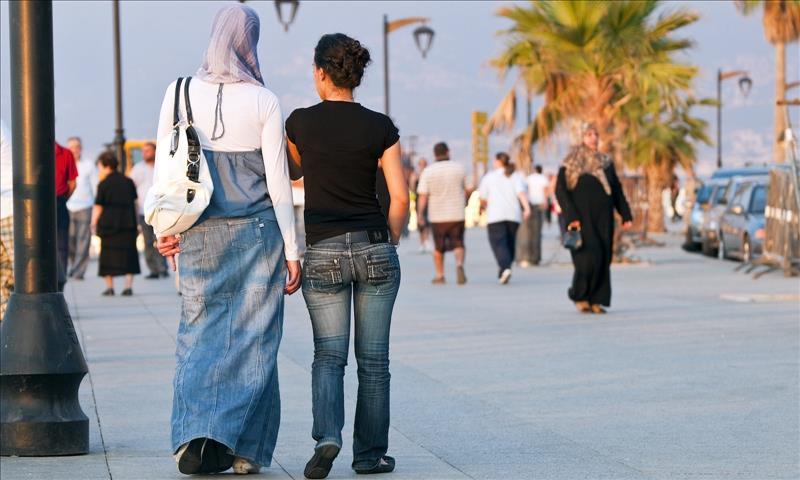
111 women running in May election but Lebanon cool on female politicians
At a recent convention on the empowerment of women in Beirut, a member of the Hezbollah Political Bureau said the military party had 'reservations' about an expanded role for women in the Lebanese Parliament – because such duties 'distract them from their homes.'
This was said after 111 women nominated themselves for the upcoming chamber for elections due to take place on 6 May this year. They will be competing with 865 men for the 128-seats Chamber.
The daily<> Must-reads from across Asia - directly to your inboxThis is a high number, given that despite its reputation for liberalism and democracy, Lebanon has known no more than 10 women MPs since the early 1960s, most of whom inherited their posts and were not voted into them.
The Hezbollah position was surprisingly made by Rima Fakhry, a graduate of the American University of Beirut who was the first woman to serve on the party's Political Bureau.
This didn't prevent Hezbollah's historical ally, the conservative all-Shiite Amal Movement, from nominating one woman for the next parliament – the current Minister of Administrative Reform, Enaya Ezzidine.
The number is much higher for secular parties and those with an all-Christian powerbase, including the Free Patriotic Movement of President Michel Aoun and the Lebanese Forces Party of Samir Gagegea.
Women journalistsProminent and well-respected women journalists will be running for office, like Paula Yacoubian of Saad al-Hariri's Future TV, Raghida Dergham of the London-based al-Hayat newspaper, and Jessica Azar of Lebanon's MTV.
Lebanese women were given the right to vote and run for office back in 1953 but they didn't get their first MP until 1963, when Myrna al-Bustani was chosen to succeed her father in parliament, the prominent businessman and philanthropist Emille Bustani, who died in a car crash off the coast of Beirut.
They then waited for another 28 years to get their second women parliamentarian, Nayla Mouawad, who was appointed to the chamber in 1991 after the assassination of her husband, President Rene Mouawad, who had been in office for 17-days only.
In the present chamber voted in in 2009, 12 women ran for office out of 702 candidates but only four of them won — all for their last name rather than any political program.
The first was Bahia al-Hariri, the aunt of current prime minister Saad al-Hariri and sister of slain Premier Rafik al-Hariri, an iconic figure in modern Lebanese history.
The second was Strida Gagegea, the beautiful wife of Lebanese Forces President Samir Gagegea, who spent long years in prison after the Civil War. The third was Nayla Tweini, daughter of assassinated journalist Gibran Tweini of the mass-circulation daily Annahar, killed back in December 2005. The fourth was Gilberte Zouein, the daughter of a prominent former MP and cabinet minister.
Can Lebanese women win seats on merit?But will Lebanese women break the glass ceiling and march into Parliament based on their virtues and political programs rather than affiliation with any of the big parties or hereditary political families that have dominated Lebanese domestics since late Ottoman times?
This would be tough since at least 38 of the powerful candidates hail from political dynasties that are allied, inter-married, or who still have relatives in high government positions. President Michel Aoun's niece will be running, for example, and so will the husbands of his two daughters, Gibran Bassil (presently Lebanon's Foreign Minister) and Chamel Rokoz, a prominent army general.
The two cousins Nadim and Sami Gemayel will be running for a Maronite seat in Mount Lebanon. They are the sons of former presidents Bashir and Amin Gemayel, two historic leaders of the Lebanese Christian community who ruled the country back in the 1980s. Sami is 37, second-in-line for his father's hereditary role after his elder brother Pierre was killed in 2006, while Nadim is 35.
Faisal Karami, 47, will be running for a Sunni Muslim seat in his native Tripoli, given that both his father Omar and grandfather Abdulhamid Effendi were both MPs and prime ministers from the 1940s until 2005.
Newcomers
Other newcomers will be Taymour Jumblatt, the son of prominent Druze leader Walid Jumblatt, whose family has been a pillar of Lebanese politics since the 19th century.
The son of ex-parliamentary speaker Sabri Hamadeh will be running for office and so will Talal Arslan, the son of ex-defense minister Emir Majid Arslan.
Tony Frangieh, the grandson of former President Suleiman Frangieh will be running for his native Zhorta, after his father Suleiman Jr stepped out of the race.
Joe Hobeika, the son of Maronite warlord Elie Hobeika will also be running for the next Chamber.
Not all of these names are nationalist figures with honorable legacies. Some hail from a very bloody past, like Samir Gagegea, a warlord turned politician, or Elie Hobeika, architect of a 1982 massacre at the Sabra & Shatila refugee camps, where, in compliance with the invading Israeli Army, he slaughtered anywhere between 1,500-3,000 Palestinians. He, in turn, was subsequently killed by a car bomb in Beirut in 2002.
<> <> <> <>
Legal Disclaimer:
MENAFN provides the
information “as is” without warranty of any kind. We do not accept
any responsibility or liability for the accuracy, content, images,
videos, licenses, completeness, legality, or reliability of the information
contained in this article. If you have any complaints or copyright
issues related to this article, kindly contact the provider above.


















Comments
No comment